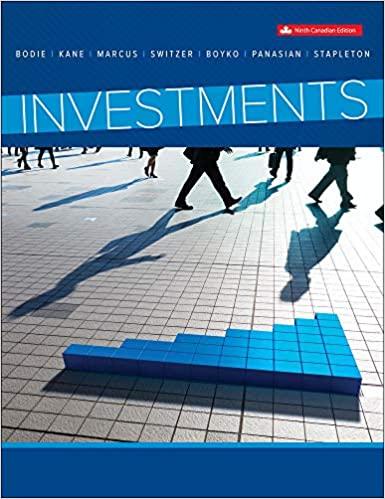1. Assume that you sell short 350 shares of a stock when the market price is 32.10-32.15....
Question:
2. Assume that you sell short a 3.5% semi-annual coupon bond when the market interest rate is 4% (and you buy on a coupon payment date so that the price is clean). You deposit the short proceeds plus a 15% haircut that you pay out of your own capital. 18 months later, interests rates have raised to 4.3%, and you close the position by buying back the bond. If the repo rate is 2%, what is the net profit from these trades? What is the percent return, based on your out-of-pocket capital investment only? What is the effective annual rate for this investment?
3. If a non-dividend paying stock is trading today at $52 when the interest rate is 3%, what is the 8- month forward price? If the forward contract is available at a price of $51, what three transactions should you make in order to earn the available arbitrage profit? How much money could you make 8 months from now, and what is the present value of that profit today?
4. A stock is trading today at $90, and the company is expected to pay quarterly dividends of $0.45. The continuously compounded interest rate is 4.2%. What is the 10-month forward price? What is the price of a prepaid 10-month forward? If the price of the stock in 10 months is $95, what is the profit or loss from the forward contract?
5. If the exchange rate is currently $2.10/₤ when the pound interest rate is 3% and the dollar interest rate is 1.5%, what is the correct price for a 1-year forward contract? (All rates are continuously compounded.)
6. Assume that you have a well-diversified portfolio valued at $3 million with a beta of 1.8, but you have a negative outlook on the short-term prospects of the market and want to reduce your market risk using index futures. In particular, you want to reposition your portfolio to have a beta to 0.7. Assume that the S&P 500 is trading at a price of 2,800, the futures multiplier is $250, and the futures price is currently 2,770. How many futures contracts would you need to trade long or short in order to alter the beta?
Broker
A broker is someone or something that acts as an intermediary third party, managing transactions between two other entities. A broker is a person or company authorized to buy and sell stocks or other investments. They are the ones responsible for... Coupon
A coupon or coupon payment is the annual interest rate paid on a bond, expressed as a percentage of the face value and paid from issue date until maturity. Coupons are usually referred to in terms of the coupon rate (the sum of coupons paid in a... Exchange Rate
The value of one currency for the purpose of conversion to another. Exchange Rate means on any day, for purposes of determining the Dollar Equivalent of any currency other than Dollars, the rate at which such currency may be exchanged into Dollars... Portfolio
A portfolio is a grouping of financial assets such as stocks, bonds, commodities, currencies and cash equivalents, as well as their fund counterparts, including mutual, exchange-traded and closed funds. A portfolio can also consist of non-publicly...
Fantastic news! We've Found the answer you've been seeking!
Step by Step Answer:
Related Book For 

Investments
ISBN: 9781259271939
9th Canadian Edition
Authors: Zvi Bodie, Alex Kane, Alan Marcus, Lorne Switzer, Maureen Stapleton, Dana Boyko, Christine Panasian
Question Posted:





